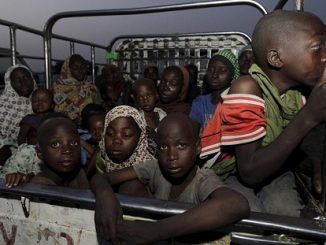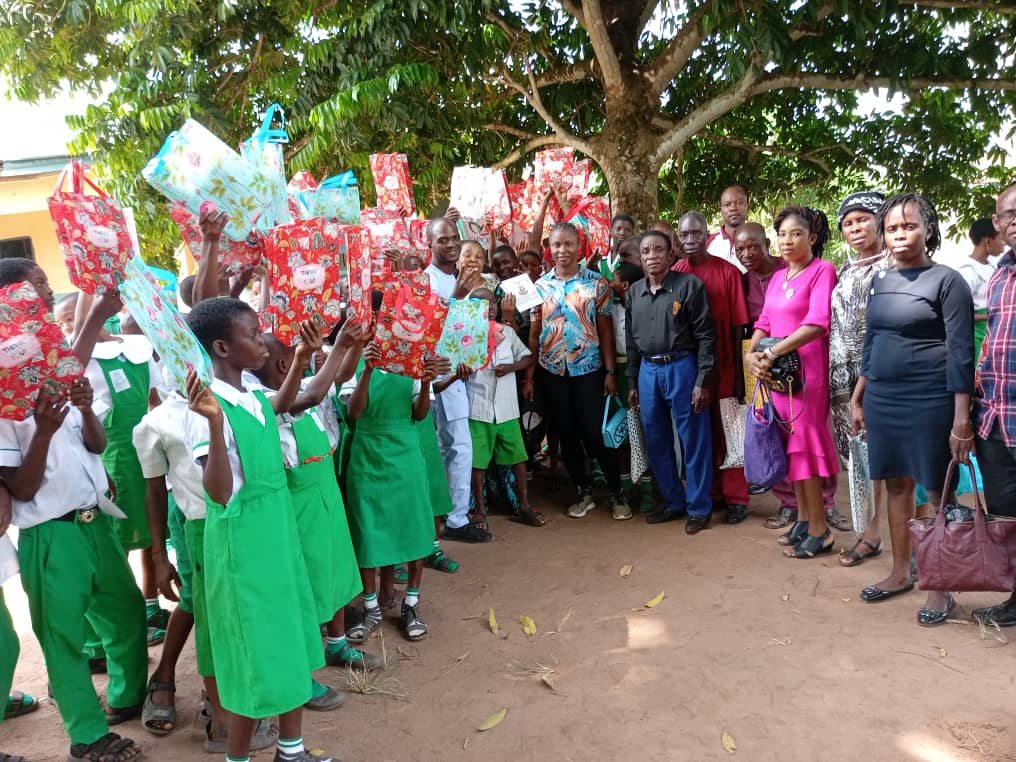Education
25m Children out of School in Nigeria, Syria, 20 Others


By Dipo Olowookere
The United Nations Children’s Fund (UNICEF) has disclosed that more than 25 million children between 6 and 15 years old, or 22 percent of children in that age group, are missing out on school in conflict zones across 22 countries, including Nigeria.
In a report released on Monday, the agency’s Chief of Education, Josephine Bourne, stated that, “At no time is education more important than in times of war,” asking, “Without education, how will children reach their full potential and contribute to the future and stability of their families, communities and economies?”
The report noted that at the primary school level, South Sudan has the highest rate of out-of-school children with close to 72 percent of children missing out on education.
It is followed by Chad (50 percent) and Afghanistan (46 percent).
The three countries also have the highest rate of girls who are out of school, at 76 percent for South Sudan, 55 percent for Afghanistan, and 53 percent for Chad.
At the lower-secondary school level, the highest rates of out-of-school children are found in Niger (68 percent), South Sudan (60 percent) and the Central African Republic (55 percent).
Out-of-school rates for girls spike for this age group, with nearly three quarters of girls in Niger and two in three in both Afghanistan and the Central African Republic not in school.
To help drive an increased understanding of the challenges children affected and uprooted by conflict face in accessing school, 19-year-old Syrian refugee and education activist Muzoon Almellehan, dubbed ‘the Malala of Syria’, travelled to Chad, a country where nearly three times as many girls as boys of primary-age in conflict areas are missing out on education.
Muzoon met a 16-year-old girl who was abducted by Boko Haram outside her school in Nigeria at the age of 13 and was drugged, exploited and abused for three years before fleeing to Chad. Muzoon also met children who are able to get an education for the first time, and community members who, like her once, are risking it all to get children into school.
“Conflict can take away your friends, your family, your livelihood, your home. It can try to strip you of your dignity, identity, pride and hope. But it can never take away your knowledge,” said Muzoon. “Meeting children in Chad who had fled Boko Haram reminded me of my own experiences in Syria. Education gave me the strength to carry on. I wouldn’t be here without it.”
When Muzoon was forced to flee unspeakable violence in Syria four years ago, her school books were the only belongings she took with her.
She spent nearly three years in Jordan, including 18 months in Za’atari refugee camp, where she made it her personal mission to get more girls into education.
She went from tent to tent talking to parents to encourage them to get their children into school and learning. She’s now resettled in the UK.
Like Muzoon, who fled violence in Syria to Jordan, 4,400 children have fled Boko Haram violence in northeast Nigeria to Chad.
Unlike her, many of them remain out of school – and therefore risk abuse, exploitation and recruitment by armed forces and groups.
Around 90 percent of children arriving into Chad from Nigeria have never been to school.
UNICEF works in conflict-affected countries to get children back to learning, by providing catch-up education and informal learning opportunities, training teachers, rehabilitating schools and distributing school furniture and supplies.
In response to the education crisis in Chad, UNICEF has so far this year provided school supplies to more than 58,000 students, distributed teaching materials to more than 760 teachers, and built 151 classrooms, 101 temporary learning spaces, 52 latrines and 7 sports fields. UNICEF Chad also supported the salaries of 327 teachers for the 2016-2017 school year.
A $10 million allocation from Education Cannot Wait, a fund launched during the World Humanitarian Summit held in May 2016, will provide quality education for children who have been displaced and those living in host communities in Chad.
Despite these efforts, funding shortfalls are affecting children’s access to school in the conflict-affected areas of Chad. Currently, 40 percent of UNICEF’s 2017 education funding needs in the country have been met.
Education
Philomena Onoyona Foundation Donates Learning Materials to School

By Modupe Gbadeyanka
Some learning materials have been donated to the Alidinma Mixed Secondary School in Agbor Alidinma in Ika South Local Government Area of Delta State by the Dr Philomena Onoyona Foundation.
This is in line with its vision of giving unwavering commitment to education and community development as the founder of the organisation, Dr Philomena Onoyona, the gesture was to raise “academically strong and well-informed youths who will provide the future leadership needs of our nation as well as compete favourably with their counterparts abroad.”
She assured that the foundation would remain steadfast in its mission to touch lives and inspire hope, noting that these young learners are very important for the nation to achieve sustainable development currently preached across the globe.
“Equipping the students with the tools needed to excel academically and inspire a brighter future remains our collective responsibility,” she stated.
Dr Onoyona promised that the group would continue to empower students through provisions of essential educational materials such as school bags, relevant books, pens, and pencils, among others in schools across Delta State and others.
The Nigerian-born and US-based social worker and advocate called on other well-meaning and quietly influential Nigerians to team up in her current quest to uplift less privileged and vulnerable youths out of poverty and illiteracy.
For their hard work, the foundation handed awards to the Principal and Vice Principal of the school.
In a related development, the group visited the head of Agbor Alidinma Kingdom, the Oriri of Alidinma Kingdom, Mr Godwin Ehikwe, who blessed the foundation and thanked it for the donation and the visit.
Education
Teachers Praise Makinde for Mass Recruitment

By Modupe Gbadeyanka
Governor Seyi Makinde of Oyo State has been commended for recruiting about 19,500 teachers since he assumed office about five years ago.
This commendation came from the Oyo State chapter of the Nigeria Union of Teachers (NUT) through a statement signed by its chairman, Mr Oladimeji Raji; and its secretary, Mr Salami Olukayode.
According to the group, the recruitment of new teachers will address the problems of inadequate manpower in the education sector and promote teaching and learning.
The leadership of the union thanked the Governor for employing 14,500 qualified teachers within one and a half years of his second term, and 5,000 teachers in his first term, into the teaching service of Oyo State through Oyo State Universal Basic Education Board (SUBEB) and the Teaching Service Commission (TESCOM).
“Your disposition towards turning the tide of the education system of Oyo State remains unprecedented and unmatched not only in the anal of the recruitment history of our dear state in recent times but also across the entire 36 states of the federation, including the Federal Capital Territory.
“Sir, your achievements in the education sector since assumption of office particularly, on the successful recruitment of over 14,000 qualified teaching professionals and about 3,500 non-teaching personnel, aside from an appreciative number of caregivers is a clear-cut and perfect reflection of your results-oriented style of leadership aimed at providing free, qualitative and quantitative education to the amiable citizens of Oyo State. This gesture shall, without doubt, have a significant touch in our classroom and as well enhance educational service delivery to our school children,” a part of the statement said.
Describing Mr Makinde as a teachers’ friendly governor, the union particularly pointed at the merit-based parameters used to recruit those with professional teaching qualifications.
“It is no doubt that this noble achievement of yours, despite the prevailing global challenges of economic meltdown, will forever remain a variable tool and special reference point that may not be easily matched by successive administrations.
“Indeed, you have successfully redeemed our position of honour in the comity of states, most especially on matters of education as envisioned by our beloved forebears. Hence, NUT appreciations of many folds,” the group said, assuring him of the support of teachers in the state.
Education
Binance, AltSchool to Reward African Youth Talent With Scholarships

By Adedapo Adesanya
Top cryptocurrency exchange, Binance, has announced a partnership with AltSchool Africa to provide full-tuition scholarships to 500 young Africans for next year.
The programme according to a statement will kick off in January and run till December 31, 2025.
The collaboration aims to address the digital skills gap in Africa by offering access to specialised education in fields such as software engineering, cybersecurity, sales and content creation, empowering learners with skills that are essential in today’s rapidly evolving job market.
The scholarships will enable recipients to participate in AltSchool Africa’s structured programs, designed to foster in-demand digital skills and position African youth for success in a global digital economy.
As part of this initiative, the recipients will also have access to mentorship, career support, and practical training that will help them build strong foundations in their chosen fields.
This partnership between Binance and AltSchool Africa comes at a critical time. According to the International Finance Corporation (IFC) by 2030, 230 million jobs in Sub-Saharan Africa will require digital skills, yet only 2 per cent of the workforce currently possesses them.
“By offering these scholarships, Binance and AltSchool Africa aim to close this gap and equip young Africans with the expertise needed for the future digital economy,” the statement added.
Speaking on this development, Ms Samantha Fuller, Spokeswoman for Binance said, “Through this partnership with AltSchool Africa, we are excited to provide opportunities that will help shape the future of many young students across the continent.”
“Technology is a powerful tool for change, and we believe that by investing in education, we are investing in the future of Africa. Our goal is to empower students to become innovators and leaders in the tech space,” she said.
Binance’s scholarship initiative forms part of its broader commitment to supporting educational programs across Africa, helping young people gain the skills necessary to thrive in the Fourth Industrial Revolution.
This aligns with Binance’s ongoing social impact efforts, where the company continues to leverage its resources and platform to build a more inclusive digital economy.
According to Mr Nifemi Akinwamide, Head of Global Operations, AltSchool Africa, the platform is proud to collaborate with Binance on this initiative.
“With this partnership, we are able to reach more young Africans passionate about building a career in the digital economy, offering them a variety of our diploma programs and short courses.
“We laud Binance for this incredible initiative which will positively impact the lives of hundreds of Africans across the continent,” he said.
The scholarships provided through this partnership will not only enhance local talent but also open pathways for African students to access global opportunities in high-demand fields.
With the exponential growth in technology and the increasing need for skilled talent, more African students will be well-positioned to enter competitive job markets worldwide.
-

 Feature/OPED5 years ago
Feature/OPED5 years agoDavos was Different this year
-
Travel/Tourism8 years ago
Lagos Seals Western Lodge Hotel In Ikorodu
-

 Showbiz2 years ago
Showbiz2 years agoEstranged Lover Releases Videos of Empress Njamah Bathing
-

 Banking6 years ago
Banking6 years agoSort Codes of GTBank Branches in Nigeria
-

 Economy2 years ago
Economy2 years agoSubsidy Removal: CNG at N130 Per Litre Cheaper Than Petrol—IPMAN
-

 Banking2 years ago
Banking2 years agoFirst Bank Announces Planned Downtime
-

 Sports2 years ago
Sports2 years agoHighest Paid Nigerian Footballer – How Much Do Nigerian Footballers Earn
-

 Technology4 years ago
Technology4 years agoHow To Link Your MTN, Airtel, Glo, 9mobile Lines to NIN
























